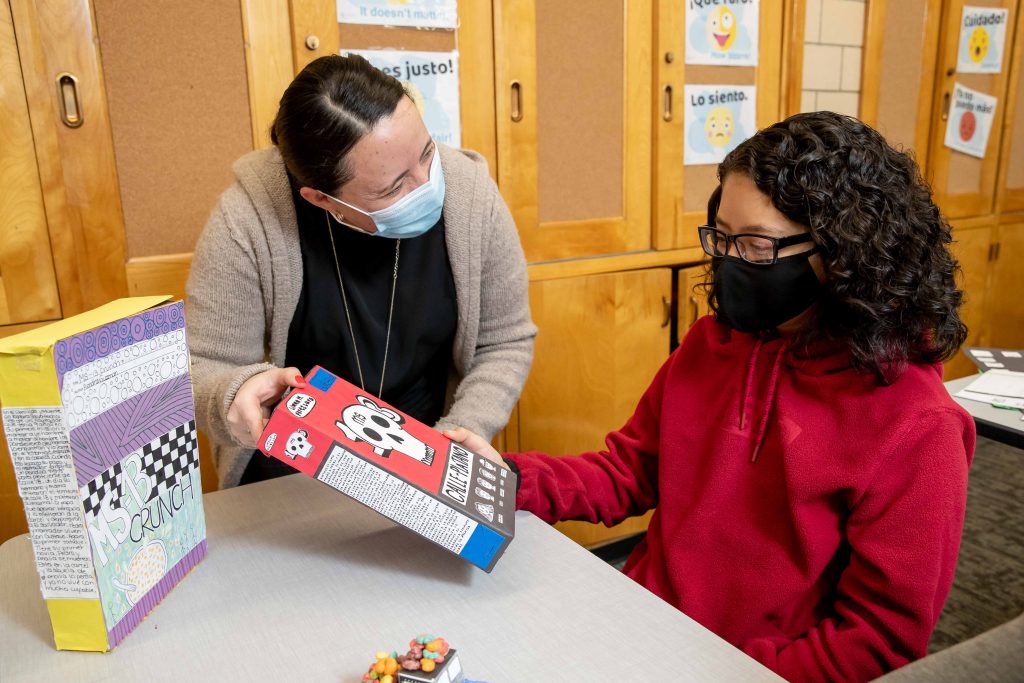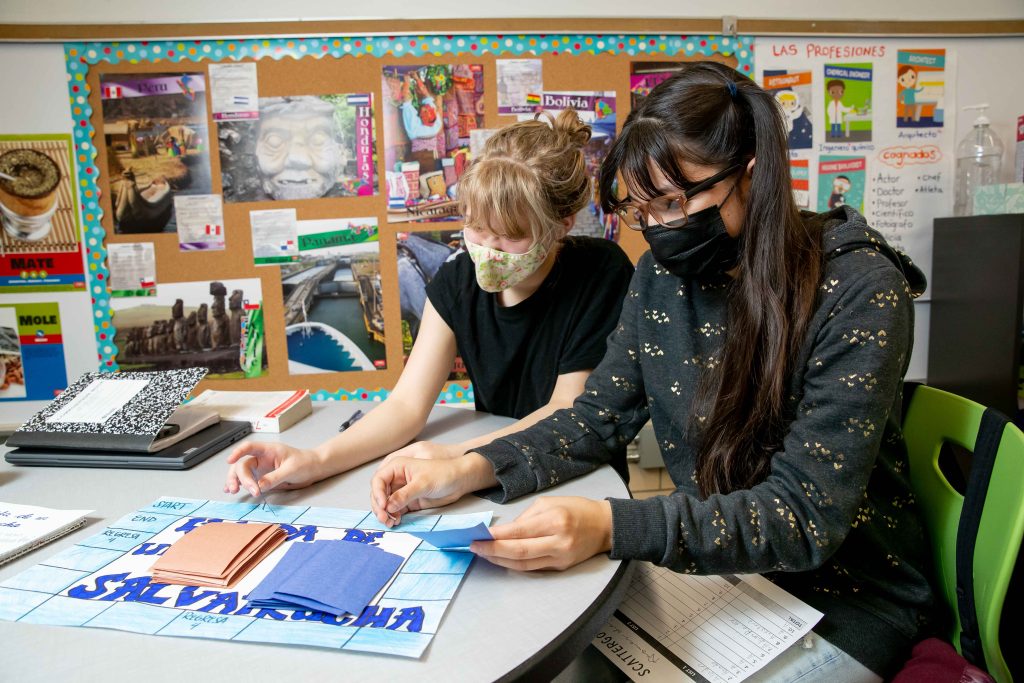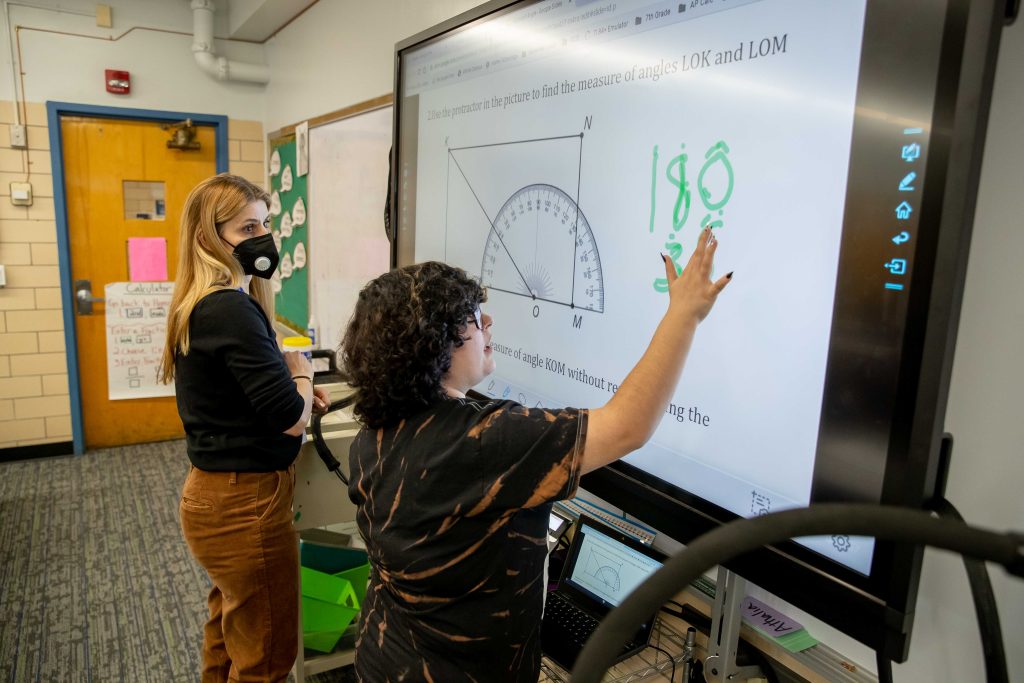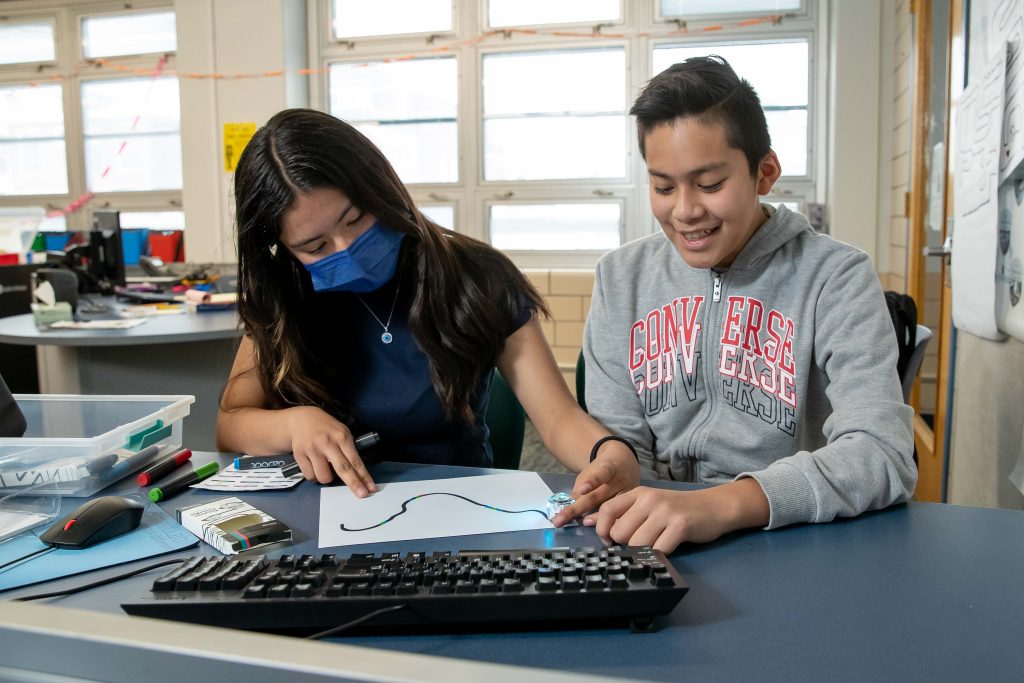



DCIS high school students have the opportunity to pursue advanced learning through both Advanced Placement (AP) and honors coursework. Both types of coursework offer additional levels of academic challenge, support college readiness and carry a higher weight in a student’s GPA than on-level courses.
AP courses open doors by providing students with the opportunity to engage in a subject through rigorous college-level work. AP courses give students the chance to demonstrate to themselves and to colleges and universities that they are college-ready. By pursuing AP courses and passing AP tests, students can earn college credit and/or advanced standing at the college or university at which they enroll upon graduation from DCIS.
Students taking three or more AP courses should expect a workload equal to that of freshmen at the most selective colleges. For that reason, we encourage students who wish to take multiple AP courses to first carefully evaluate their total workload in relation to their other classes and activities. Because DCIS is a small school and doesn’t offer all AP classes every year, students also need to plan ahead based on which courses will be offered not only for the upcoming academic year, but for subsequent years as well.
The following AP courses are available to DCIS students:
All students who are enrolled in AP courses are required to take the AP exam for each AP course on the national test dates in May. Students take practice exams before then to help them prepare. Students must complete the entire yearlong course and take the AP test to receive AP course credit and the weighted grade. Failure to complete the exam will result in an alteration of the transcript to reflect enrollment in a regular course of study.
Because students are required to take the AP exam for each AP course in which they enroll, we want both parents and students to understand the financial commitment as well. The cost per AP exam is around $95 and is subject to change. Because financial need should not prevent students from taking college-level classes, students who have qualified for Free and Reduced Lunch can take the AP exams at a substantially lower cost. Payment for AP exams is due in mid-April, and specific payment information (including how to apply for reduced fees), as well as the AP exam schedule, goes out to families in late March/early April.
Many DCIS high school classes offer an honors option, allowing students to demonstrate the ability to take on challenging work as part of a regular course of study. Students may opt into the honors option during the first six weeks of the semester, signaling to their teacher that they are interested in pursuing advanced study through alternative work embedded in the course. The honors option is available in all high school English, science and math courses; world language classes level 3 and beyond; and in some high school electives.
COPYRIGHT 2020 DENVER CENTER FOR INTERNATIONAL STUDIES | ALL RIGHTS RESERVED
Students identified as English language learners will be enrolled in an English Language Development (ELD) class, in which they will receive extra help with reading, writing, listening and speaking English. ELD replaces a world language class or an elective. Click or tap here to view frequently asked questions and answers about ELA services. If you have additional questions about the ELA program at DCIS, please contact Assistant Principal Jen Warren.
All Denver Public Schools have some type of ELA Parent Advisory Committee (ELA PAC) to facilitate effective communication between families of ELA students and the school. At DCIS, these meetings are part of the monthly Parent-Principal Coffees for Spanish-speaking parents. If you would like to be involved with our school’s ELA PAC, contact DCIS Instructional Dean Jenna Martin or the DPS Office of Family and Community Engagement.
At the district level, families of ELA students can participate in the ELA Districtwide Advisory Committee (ELA DAC). The ELA DAC meets monthly during the school year to inform families and generate discussion about issues that affect English language learners in Denver Public Schools. Click or tap here to learn more.
A key component of a DCIS education is the requirement that students develop a portfolio of their best work each year that reflects the four Graduation Portfolio System (GPS) domains of global leadership that drive our curriculum (Investigate the World, Recognize Perspectives, Communicate Ideas, Take Action).
For each work in their portfolio, students include an artifact (i.e., representative documentation) of the piece, such as photographs, a link to a YouTube video for a performance-based project, a screen capture of a web page with a link to the student-created website, a promotional flyer for a student-conceived and -run festival, etc.
Although portfolios in the past were largely paper-based, DCIS has increasingly moved toward more online portfolios. Beginning with the class of 2021, all high school students are required to create a website to showcase their best work.
Students work with their Advisement teacher to keep the portfolio up to date through the end of their senior year, when they formally present their portfolio to a panel for review. The presentation typically results in a recommendation that the student receive the Diploma of International Studies, which becomes part of the portfolio.
The Advisement program is a cornerstone of the DCIS experience, serving as a consistent home community for students. Each Advisement class consists of approximately 20 students in the same grade who develop close, supportive relationships with one another and with their teacher. To the extent possible, students remain with the same peer group and Advisement teacher throughout their time at DCIS.
Advisement provides time and space to build community, monitor progress toward continuation (middle school) and graduation (high school), develop and refine student portfolios, discuss current events, attend community meetings, and more. Advisement also provides a space for students to develop service project ideas and allows time for students to log service hours completed
The ability to speak, read and write in more than one language can set students apart from the crowd, whether they’re entering college or the job market. The Seal of Biliteracy is awarded to students who demonstrate that they have attained proficiency in two or more languages by the time of their graduation from high school. The Seal of Biliteracy appears on the student’s transcript and diploma and highlights a student’s language skills for colleges, universities and future employers.
Please see this website for information about how to earn the seal and this website for more info about the seal (the application and timeline). If there are questions, please reach out to Dr. Martin.
Section 504 is a federal law that protects the rights of individuals with disabilities in schools. Students determined to have an eligible disability under Section 504 are entitled to a “free appropriate public education,” which includes the provision of regular or special education and related aids and services designed to meet the student’s individual educational needs as adequately as the needs of nondisabled students are met.
Our Special Education program is committed to providing a quality educational experience based on the individual needs of each child to minimize the impact of their disability through a continuum of services, ranging from those provided in a general education classroom to those in fully contained classroom settings.
In addition to getting help from special education teachers, students with disabilities may receive support from paraprofessionals, nurses, school psychologists, social workers, speech therapists and physical therapists. The goal of special education is to provide services that allow students with disabilities to acquire the skills to pursue independent living and post-secondary readiness.
Every child with a disability who attends public school and receives special education and related services must have an Individualized Education Program (IEP). An IEP is a document uniquely designed for one specific student, with the intention of improving educational results for that child. Each IEP must be created in compliance with the Individuals with Disabilities Education Act (IDEA) and, in Colorado, the Exceptional Children’s Education Act (ECEA).
Parents who are interested in the quality of education received by children and youth with special needs can connect with the district’s Special Education Advisory Council (SEAC). Click or tap here to learn more.
If you have any questions about the Special Education program at DCIS, your child’s 504 or IEP, or any related matters, please contact the following: